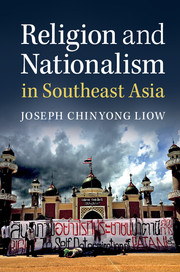Book contents
- Frontmatter
- Dedication
- Contents
- Preface
- Acknowledgments
- Glossary
- Introduction
- 1 Faith and Flag
- 2 Southern Philippines: Reframing Moro Nationalism from (Bangsa) Moro to Bangsamoro
- 3 Thailand's Southern Border Provinces: Constructing Narratives and Imagining Patani Darussalam
- 4 Malaysia: Religion, Ethno-Nationalism, and Turf-Guarding
- 5 Indonesia: Contesting Principles of Nationhood
- Conclusion
- Bibliography
- Index
Conclusion
Published online by Cambridge University Press: 05 August 2016
- Frontmatter
- Dedication
- Contents
- Preface
- Acknowledgments
- Glossary
- Introduction
- 1 Faith and Flag
- 2 Southern Philippines: Reframing Moro Nationalism from (Bangsa) Moro to Bangsamoro
- 3 Thailand's Southern Border Provinces: Constructing Narratives and Imagining Patani Darussalam
- 4 Malaysia: Religion, Ethno-Nationalism, and Turf-Guarding
- 5 Indonesia: Contesting Principles of Nationhood
- Conclusion
- Bibliography
- Index
Summary
In the conclusion to his 1963 study on religion and nationalism in Southeast Asia, the eminent political scientist Fred R. von der Mehden proposed that: “twentieth-century Southeast Asia is an excellent laboratory in which the relationship of religion to politics can be assessed against changing political and social backgrounds. The past fifty years have seen peoples lacking political, economic, and social cohesion assume nationhood and finally statehood.” Forty years later, in a quantitative article published in 2004 that collated data from the Minorities at Risk and State Failure datasets, Jonathan Fox found that since 1980, religious nationalist groups were responsible for more cases of conflict (specifically armed violence) than non-religious nationalist groups. These two observations may seem unrelated, but they provide important points of entry, as well as bookends, for this study as it draws to a conclusion.
In a sense, this book has picked up the Southeast Asian story where von der Mehden left off. It has done so by unpacking several conflicts in Southeast Asia that have commanded widespread popular attention recently, and that appear religious in nature by virtue of the frequent use of religious symbols, metaphors, and narratives to describe them on the part of media, academia, and, most significantly, conflict actors themselves. Rather than treading the beaten path to pinpoint whether or not these conflicts are “religious” in the strict sense of the term, this book has chosen to offer an alternative interpretation of religious conflicts in Southeast Asia. The search for a different approach provoked a series of questions. How do we understand the element of religion in the contemporary intrastate conflicts that have arisen in Southeast Asian societies? Indeed, why have these conflicts even taken on a confessional nature and found religious expression? How should we understand the veracity of their religious contents and claims? These questions are of signal importance because of their analytical novelty in the sense that no one else has asked these questions substantively of Southeast Asian intrastate conflicts, certainly not in the context of a comparative study contained in a single volume.
The book has set out the basic premise that religious identity and discourses have been important in the framing of political conflicts in Southeast Asia. Indeed, in all the cases investigated here, conflict actors have themselves often framed their actions in religious terms in one way or another.
- Type
- Chapter
- Information
- Religion and Nationalism in Southeast Asia , pp. 218 - 231Publisher: Cambridge University PressPrint publication year: 2016

